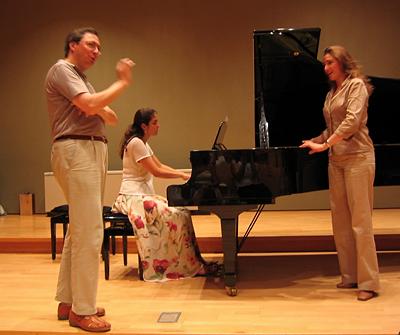|
<< -- 7 -- Tess Crebbin DIVING INTO THE MUSIC

TC: How exactly can an accompanist work with the singer to help him, here or there?
WR: There are some obvious ways, and some not so obvious. If someone is hoarse, for instance, there is not much you can do. On the other hand, if a singer struggles with the high notes, you play the piece a semitone or tone lower, which makes a lot of difference. If you notice that someone is running out of breath you can tighten up the long phrase a little. I think this is comparable to what happens in any other sports team. There is no such thing as a catalogue of reactions that you pull out of your sleeve, like: when this happens, I do that. Rather, if you are a good team then you intuitively feel what the other needs right now to make things easier on him.
TC: How do you work with tempi? Rule of thumb: light voices, faster tempi?
WR: There are no rules of thumb in the manner you suggest. First of all, it depends on the piece you are playing. That out of the way, experience has taught me that it depends a lot more on the personality of the singer than on his voice, although the two naturally go hand in hand.

Teaching by demonstration
|
TC: Do you still always rehearse, even with singers you regularly work with? Let's say with someone like Thomas Hampson? You guys are always together.
WR: I do. You have to keep in mind that each concert is different. Also, in between our performances, we do other things. So we have different experiences that influence us, may change us and enrich us, or whatever. Sometimes these experiences lead to new ideas that you want to try out with the other.
TC: You discuss that during rehearsals?
WR: Discuss is not quite the right word. We make music together and I think the most effective work is done without words, stemming from being connected with each other. You are automatically in tune with the other if you know him well, like him, and understand him.
TC: The longer you work together, the better it gets? So, even someone like you, at the top of their own field, would have problems if I put a singer in front of your piano whom you do not know?
WR: That remains to be seen. It depends on the individual case. That is why we have safety rehearsals for when understanding is not that easy. But in most cases contact is established very quickly between singer and accompanist, close contact leading to a deep intuitive understanding of each other. You see, it is music that binds us together and music is a very powerful connecting force that can truly unite people.
Continue >>
Copyright © 29 July 2004
Tess Crebbin, Germany

| 
